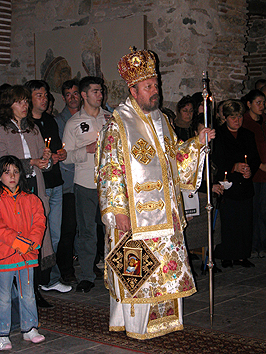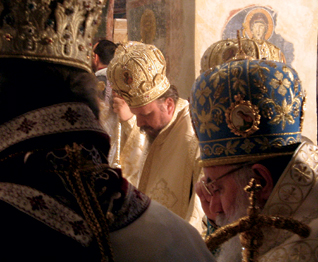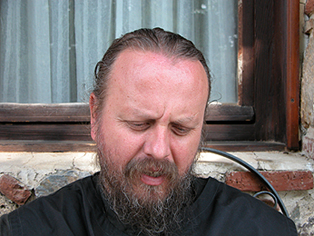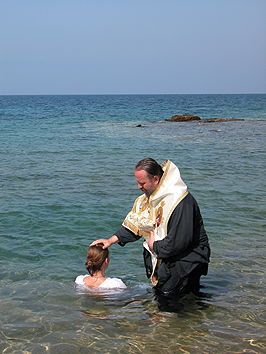Talks should continue where they were interrupted (full version)
(
18.11.2005
)

1) In what way are church borders changed and how is church jurisdiction determined?
Throughout history it has happened mainly in one way, and that is the external one: whenever by means of war or a treaty certain foreign territories had been conquered, or one’s own regained, or when at that new states had been established, or old ones restored, and also whenever it has been the will of the state (imperial) authority, church borders have been redrawn and church jurisdiction altered. This external way has most often been pastorally justified, too, and that is why it has been sanctioned with the sacred canons of the Church (IV Ecum. 17; II Ecum. 2). Only in the case of R. Macedonia and the Macedonian Orthodox Church out of to us well known political reasons, this church-pastoral and canonical practice is interrupted. There is one more, impermissible, external way, which is based on the principle of phyletism, and that is the church organization in the diaspora. Theoretically there is also the ‘internal’ way.
2) Can we recognize in the ‘Vraniškovski’ case an attempt to change the real church jurisdiction?
As an idea in the heads of a few overambitious Serbian episcopes—yes, however, that is not the main idea of Vraniškovski, too! In R. Macedonia neither were there signs of preparation to alter the real church jurisdiction nor were there pastoral conditions for it. Vraniškovski knew this very well. That is why this thoughtless attempt, too, which some episcopes of the SOC made through him in order to tear off part of the flock that belongs to the MOC, has definitely failed.
3) What are the consequences we are facing now, after all that has happened, and what did Vraniškovski want to achieve anyway, that is, what were his main idea and goal?
Deepening of the administrative-church split between the two sisterly Churches, the MOC and the SOC, the great scandal this discord caused among the traditional Christians in the two Orthodox and fraternal countries, as well as the interruption of the dialogue between the two Churches, and this in a stage that was all the closer to an acceptable church solution—these are the consequences we are now facing and ought to heal. A great discord and sin before God has happened, and that in a time when the Orthodox Church should consolidate its lines.
Now, when we look for the one guilty of a crime, we first ask ourselves who could profit from it and in this manner we most frequently find out both about the doer and his objective. In our case, apart from the devil, the only one to profit from the emerged situation is Vraniškovski: within the SOC he has preserved his episcopal rank, which had already been in danger in the MOC, and has acquired high church titles on top of it. This, unfortunately, was his motive and also his main idea and goal.
4) Why do You claim this?
Because the defection to the SOC coincides with the time when the several-months internal control empowered by the Holy Synod of the MOC was concluding the investigation about his illegal financial and material work. For a part of his illegal work apart from the 
In simple words, caught in the act of theft he got anxious about his high church position and defected to the SOC in order to preserve it there. At the same time, as to be accepted, he had to offer that Church his services against the MOC. Is there still anyone naïve to believe that all bad that has happened lately between the MOC and the SOC has occurred for the sake of some ideals, for the sake of certain canonical and liturgical unity and healing of a certain schism? May the Lord keep us from such fallacies!
Certainly, we should also not forget his idea to become an Archbishop, his utterly strained relations with the Synod of the MOC alike. Many impetuous and irrational things followed… Still, we hate the sin, while the sinner we love… I have forgiven him…
5) What is the responsibility of the SOC regarding the emerged crisis?
Some episcopes of the SOC have tried to use the emerged crisis in the MOC for their personal promotion in the struggle behind the scenes around the patriarchal throne in the SOC. Simply, they have swallowed the bait: in the attempt to preserve his high church position, Vraniškovski made use of false information and promises, that is, that a great number of episcopes, priests, monks and devout laity of R. Macedonia was to join the SOC along with him if he got their support, although he knew well this was not the truth. No one among the competent episcopes of the SOC checked this information—something that could have been settled by a single picking up of the receiver. In my opinion, their responsibility is much greater.
6) How much politics is there in all these church events?
Much, not to say that all is politics. You see, on a purely theological level, in Niš we reconciled almost all the canonical and liturgical disagreements that far between us and reached a draft-agreement with the SOC much more favorable than for instance certain Churches have with the Constantinopolitan Patriarchate. Some Churches, as for example the Greek one, are bound to go to
Holy Myrrh, in conformity with the sacred canons of the Church, can be prepared by every episcope in his diocese and this is at the same time an instrument by which the episcope controls his clergy. However, the preparation of the Holy Myrrh cannot be an instrument to control entire local Churches. All the episcopes who have to go to
 However, after we had nearly finalized the church content of our agreement without any bigger disagreements, immediately we were at cross purposes and clashed with the Serbian commission when it came to the political dimension and content of the agreement. Right at the working meeting in Niš, and this is recorded somewhere in the minutes, both theirs and ours, we clearly pointed out to the Serbian delegates and warned them that without the term ‘independence’ and without the name ‘Macedonian Orthodox Church’ there is no agreement with them nor could such an agreement pass in the Holy Synod of the Macedonian Orthodox Church. That is exactly what happened. Right at the first session of our Synod after Niš, the working document was unanimously and with no discussion rejected as pastorally not completely formed, with the hope for a pastorally better solution after the continuation of the talks.
However, after we had nearly finalized the church content of our agreement without any bigger disagreements, immediately we were at cross purposes and clashed with the Serbian commission when it came to the political dimension and content of the agreement. Right at the working meeting in Niš, and this is recorded somewhere in the minutes, both theirs and ours, we clearly pointed out to the Serbian delegates and warned them that without the term ‘independence’ and without the name ‘Macedonian Orthodox Church’ there is no agreement with them nor could such an agreement pass in the Holy Synod of the Macedonian Orthodox Church. That is exactly what happened. Right at the first session of our Synod after Niš, the working document was unanimously and with no discussion rejected as pastorally not completely formed, with the hope for a pastorally better solution after the continuation of the talks.
What matters is that with the non-acceptance of our constitutional name—Macedonian Orthodox Church—and with the non-acceptance of the independent status of our Holy Church on the part of the SOC, and following the ‘Vraniškovski’ scenario which some Serbian episcopes rashly organized, clearly to everyone manifested itself the purely political dimension of the problem between our Churches. This most of all shows that some church leaders have lost themselves in the labyrinth of worldly politics, using the dogmas and canons of the Church merely as means of psychological warfare. Simply put, the problem is the name ‘Macedonia’ that was not to exist—a task worked on by some Serbian episcopes, primarily for the sake of their interests toward Greater Serbia.
7) It is an obvious attempt of the rebel metropolitan Jovan to represent himself as a martyr, how will You explain this?
Yes, we are all witnesses of the desperate, illegal and non-church attempt of the former Metropolitan of Povardarie with the aim to profit by all means: either to succeed in attracting supporters or to walk out of the whole situation as a martyr. He simply had no other choice. Imagine what his rating in the SOC would have been if along with his failure to attract the people he had also failed to gain a martyr’s image in their eyes? Indeed, his pastoral failure is evident, he did not manage to splinter a part of the Macedonian people and affiliate it with the SOC. Still, in gaining a martyric image in the eyes of some naïve and uninformed people outside R. Macedonia he partly succeeded. Only, the Orthodox Church does not lack a spiritual criterion about what is a genuine martyrdom, and what false.
At the first spiritual level, when our heart is still captured by passions, the demon attacks from within, because he has a free access (through the passions), yet only with the intensity of triggering thoughts, feelings, and desires, which if accepted, we fall. At the second level, when our heart is sufficiently cleansed from the passions, the demon cannot fight us from within (through the passions)—that is, due to our heart’s purity this kind of an assault is not sufficient to bring about a fall and therefore then the one happens through humans who are slaves to passions, and are induced by the demon. At this level, we are no longer part of the world. At this level we are bearers of the gift of the mind-and-heart prayer and of illumination of the mind. The attack through a human is more real and always powerful enough to awaken and stir up the part of the passions that has not been completely transformed and to create conditions for our fall. The visible assault through a human, although in the beginning directed toward instigation of all the passions within us that have not been completely transformed, eventually, having failed, always boils down to public enmity and hatred. This is a compulsory stage through which must pass every struggler in the mind-and-heart prayer, who, responding with love to all enmity, becomes worthy of the gift of transition from ‘illumination’ to ‘deification’.
The mind-and-heart prayer is God-s gift of a more perfect prayer granted to strugglers who are at the second degree of their spiritual growth named ‘illumination of mind’, and also a gift granted to genuine martyrs for Christ. Therefore, a man who encounters public enmity and hatred, and does not have the mind-and-heart prayer—neither before nor after the hardship—like Vraniškovski, in this case had better ask himself why he betrayed his people and Church, rather than count himself a martyr, and had better spare us the statements in the style: “in prison for Christ and illumined in its darkness”.
8) In an interview for a weekly, Vraniškovski has characterized the members of the Synod as totally amoral persons—one as an accomplice in a murder, others with sticky fingers for money, and yet others as politicos who change their stances daily. In this statement of his, timed exactly in this moment, the church leadership in the “arguments” of the schismatic sees a public investment for the final clash with the MOC. How do You interpret this?
What Vraniškovski does in political life is called a negative campaign. It is a non-Orthodox and non-church way in which he is trying to separate faithful people from the MOC and attract the same towards him. It is one thing to attract towards oneself people with one’s spiritual authority, yet another to try to do that with public judging and condemnation or with slanders and lies. In the Orthodox Church the principle ‘the end justifies the means’ is not applicable. It is a sign of infirmity and insecurity; of a defeat as well. Yet, such a way is also a criminal offence due to which he is sentenced to prison by the competent court. This verdict of the court was accepted by the American state department, too, which in its annual report stated that in the Republic of Macedonia there were no religious prisoners or detainees. And finally, this way of his speaks about himself and also reveals all who are spiritually empty or blind and cannot grasp the Gospel of Christ. And it nicely writes there: wherever the carcass is, there the eagles will be gathered together. What does it mean? Where there is a spiritual Father with a mind-and-heart prayer, that is, a Father whose person is transformed by the baptismal divine grace—which manifests itself from his heart freed from the passions, such one whose transformed word is with great authority and power and it therefore deeply penetrates into people’s hearts, bringing them light and strength and hope, drawing them towards himself, there people will gather and there a Church will happen. If the men of the Serbian high clergy were such or if the ones they sent to form a parallel hierarchy in R. Macedonia were such, the fight would be hard and we would think about whether what they are doing is perhaps the will of God, too. Now there is no reason to get upset.
9) Will the talks with the SOC continue?
I believe and hope they should and will continue. This is the stand of the Ecumenical Patriarch Bartholomew and of the Russian Patriarch Aleksey II, too, who offered himself as a mediator, and also of the other Churches. Our last meeting in Niš and the working document adopted there point towards this as well. It is interesting that they who  defend and they who denounce this document alike forget it is, as its very title says a draft-agreement, not a final one.
defend and they who denounce this document alike forget it is, as its very title says a draft-agreement, not a final one.
What is important about inter-church negotiation is the fact that any final agreement among the Churches is adopted or rejected only by their Synods or Assemblies. Hence, it is clear that without the approval of the Synod of the MOC and the Assembly of the SOC and without the signatures of the two Heads no agreement can be accepted and valid. Therefore, the signatures of the members of the two commissions are irrelevant in that sense even if they had signed a final instead of a merely draft-agreement. What is more important, neither did Patriarch Paul and the former Metropolitan of Povardarie invoke certain ‘Niš agreement’ at the formation of the Serbian exarchate in Macedonia, nor is the Serbian exarchate implementing such an agreement, nor does it exist. There is a draft-agreement as a working draft on the basis of which the standpoints of the two commissions still need to be reconciled.
Thus, both from the last working document of Niš and from the signatures of the members of the two commissions exactly this moral and legal obligation arises for the two Churches, and that is the obligation to continue the talks.
10) Is the imprisonment of Vraniškovski an impediment to continue the talks?
Yes, a relative impediment; still, there is a way to deal with it: that is a decision for his amnesty in order to cease the enmity with the SOC. This does not mean there is no criminal offence, yet if the SOC for its part gives up the way of solving this church problem it has used so far then there would be another atmosphere created and there could follow a free pardon as a decision of the President of the State. This outcome would be acceptable. Hence, the Soc and Vraniškovski should cease the impermissible attack against these three components—the clergy and laity, the name of the Church and the title of its Head, and also the Church property—since such an attack irrefutably speaks that their chief goal is annihilation of the MOC, not formation of a new religious community.
Still, we also ought to provide conditions for the people to see where they are. If they do not go out of the psychological condition ‘persecuted’, they cannot be re-socialized. I think as a spiritual father…
11) What bothers You in the political life of the Republic of Macedonia?
Paranoia and insanity and a great betrayal it is when starting from one’s personal interest or from hatred and a desire to overthrow Branko or Ljupčo, Hari or Vlado, one goes as far as to cause the downfall of the Macedonian State. Moreover, it is paranoia and insanity and a great betrayal when starting from one’s personal interest or from hatred and a desire for example to depose Cyril or Nahum, the Macedonian Orthodox Church is being destroyed. It is necessary and solely normal in all the public moves that escalate into politics to give preference to the democratic or God’s processes of change and keep the awareness that people are transient, but the Republic of Macedonia and the Macedonian Orthodox Church must stay until the end of the age. And we should not bring down our disagreements to the level of personal hatred, discords and public insults, but rather spend our power and knowledge in offering constructive proposals and solutions, in an effective love toward the Fatherland and the Church. If it whenever happens, though, our vanities to divide us, certainly one day, if we stay on the line of the rampart of our fatherland and Church, we will find each other again and will restore our union.
Therefore, let him who consciously turns out a traitor of the Church and the State, and does not repent for this, not doubt at all, God will judge him already here, in this earthly life! Such one will recall these words when the hour comes, only then it might be late… This is not an anathema; this is a fatherly warning and entreaty.